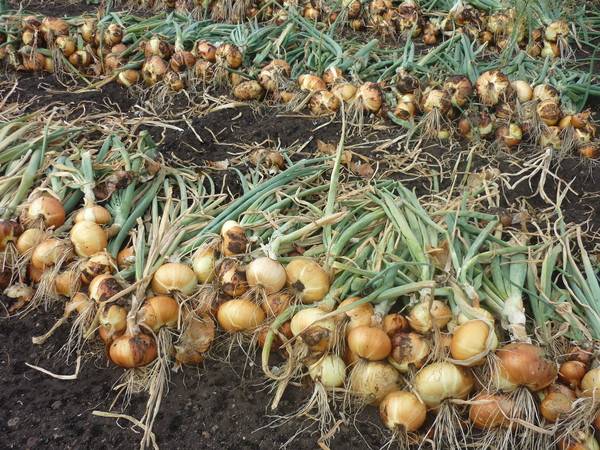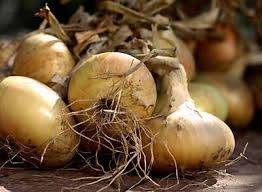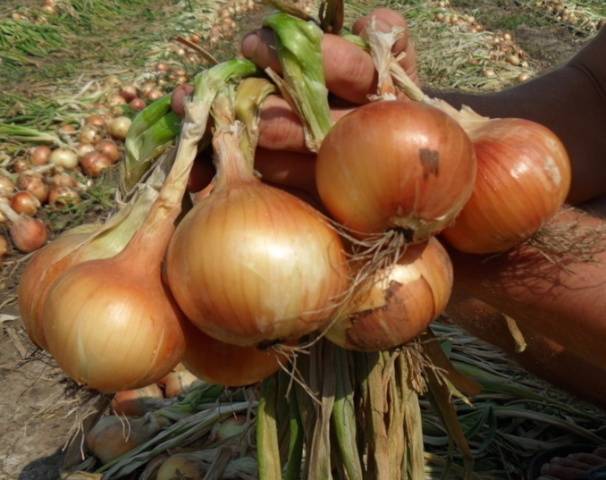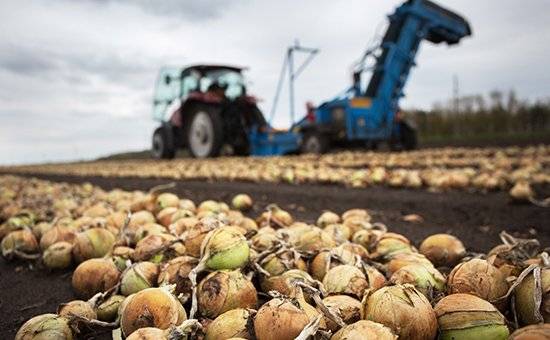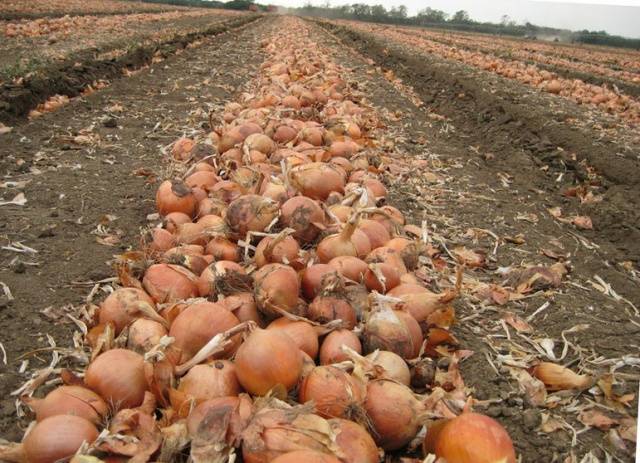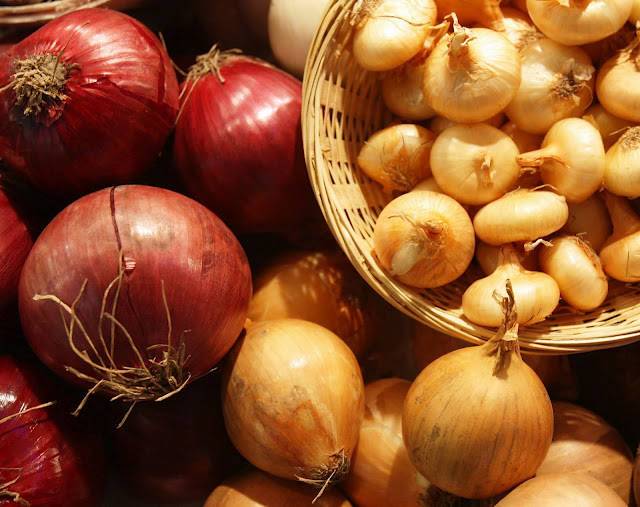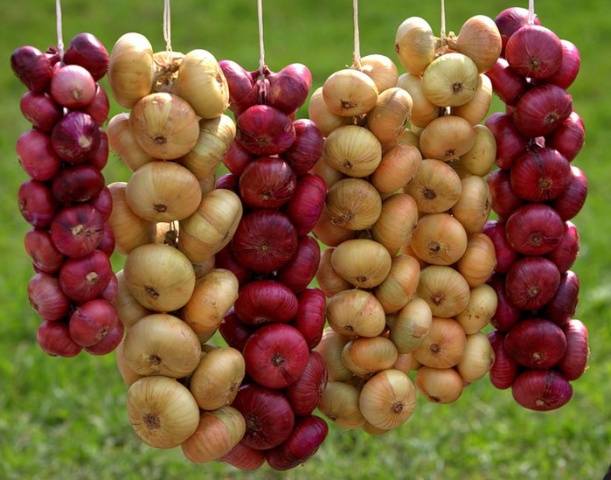Content
Almost all gardeners grow onions on their plots. This culture is in great demand in all parts of the world. But in order for the onion to be well stored, it is necessary not only to grow it correctly, but also to collect it on time. You should also know exactly how to harvest in order not to harm the bulbs. About, when the onions are removed in the middle lane, we will talk in this article.
When to collect onions
The growing period of onions directly depends on the weather conditions in the region. In central Russia, onions fully ripen in 2-3 months. It is very important to keep an eye on the top of the plant. If the green mass began to dry out and sank to the garden bed, then it’s time to stop watering. This is to prevent the root system from growing back. In addition, without water, the sprout will dry out faster, and you can start harvesting.
If the fruit dries for a long time, you can use a regular pitchfork. They lightly undermine the onions. In this case, damage to the root system occurs. As a result, the onion dries faster in the soil. Harvesting usually begins in the second week of July. If it was planted late, you can extend the dates until mid-late August.
Harvesting must be done in appropriate weather. It should be dry and warm outside. To stop growth, the shoots should be bent to the ground. Bent stems will not be able to receive nutrients, which stops growth. After a few weeks, the green mass of the plant is completely dry, and you can start harvesting.
You can determine that the onion is ripe by feather. It should dry completely. At the same time, the main stem of the plant remains soft. When pulling plants from the ground, some of the stems may come off. You can't keep onions in the garden for too long. In this case, the root system grows strongly, and this has a bad effect on the keeping quality of fruits in winter.
Leeks, unlike ordinary leeks, are not afraid of frost. It can be removed in October as well. In this case, there will be no damage to the crop. It can even be left for the winter in the beds under a special covering material.
Why is it important to remove the onion on time
Both later and earlier, digging the onions can badly affect the quality of the fruit. These bulbs will not keep well during the winter. So what we get is digging onions too early:
- the integumentary scales do not have time to form;
- the neck of the bulb remains thick, which is why it dries poorly;
- the presence of a thick neck provokes the entry of various microorganisms into the bulb. Subsequently, the fruits begin to rot;
- Such a bow cannot be stored for a long time. It must be used immediately.
Late harvest is accompanied by the following factors:
- overdried integumentary scales, which will quickly begin to crack;
- repeated growth of the root system;
- Late-harvested bulbs are also poorly stored and prone to rot.
Correct harvest
Onions are harvested at the moment when the main trunk of the plant has become soft. It is very important that he does not have time to dry out. In this case, the taste of the fruit deteriorates. The most convenient way to dig the onions is with a pitchfork. It can be inconvenient to harvest the fruit by hand, especially if the soil is dry and dense. The pitchfork does not damage the fruit itself and does an excellent job with the task.
For a day, the dug fruits are left in the garden to dry out. When doing this, take into account the weather conditions. If the air is humid, then it is better to postpone harvesting the fruits to another day or bring the fruits to a dry place. After complete drying, the bulbs are cleaned of soil and the dry stems are cut off.
If you leave the onion in the garden overnight, then you should cover it with special material or unnecessary rags. In the morning, the fruit must be opened again. Many gardeners dry and store bulbs in the attic. It is important to turn the fruit over from time to time.
Onion storage
You can determine the dryness of the fruit by the following signs:
- The top flake should be quite brittle and break easily.
- When sorting through the fruits, the rustle of the husk should be heard.
- After complete drying, the neck becomes hard and thinner.
Further, the fruits are laid out in boxes, sorted by size and grade. If some fruits are not completely dry, they are left for a while. The following containers and accessories are suitable for storage:
- wooden boxes;
- baskets;
- mesh;
- carton boxes;
- nylon tights.
Also, when sorting fruits, it is necessary to remove rotten or damaged bulbs. Previously, it was customary to braid onions and hang them in the kitchen in this form. To do this, you need to very carefully dig up the fruit without removing the feather. The storage room must be dry. In a damp place, fungi quickly multiply, due to which the onion begins to rot.
Even in boxes and boxes, it is imperative to make special holes so that the air gets inside. It is advised to store onions at a temperature not lower than 0 ° C and not higher than + 5 ° C. The bulbs do not tolerate frost well, so storing onions on the balcony will not work.
Conclusion
Now you know exactly how not to lose money with the harvest. Signs of maturity of small fruits and large onions of a turnip are no different. So the rules described above are universal. The weather conditions are different every year, and even in the same area it is difficult to guess the exact time of harvest. But by carefully observing your onion, you can determine exactly whether it is ripe or not.
